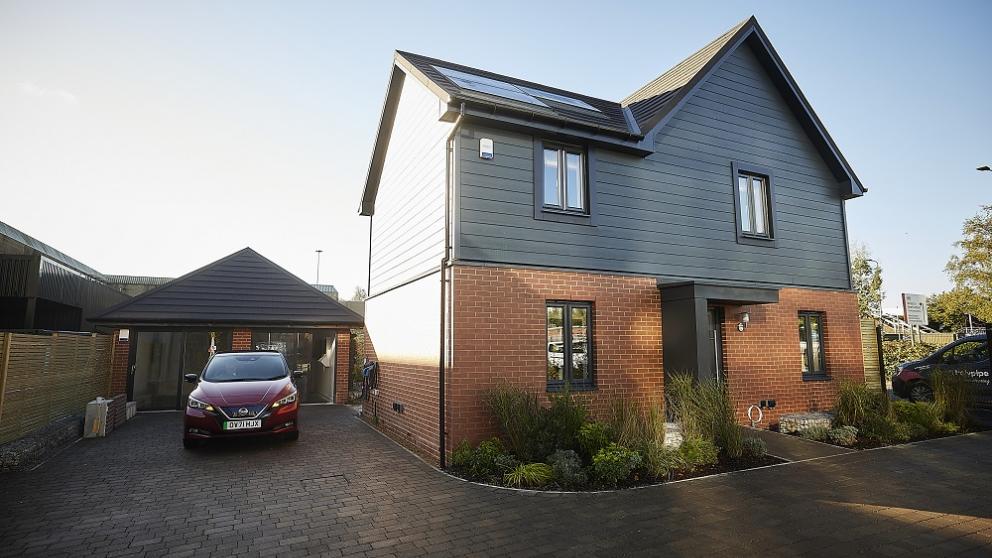Barratt House of the Future is built in Salford

Barratt Developments, the UK’s largest housebuilder, has revealed a unique flagship zero carbon home concept called the Z House located at the University of Salford. The house will be occupied and monitored to assess its performance using the research and expertise of the University’s Energy House Laboratories.
It will be the first new home in the country built by a major housebuilder to go beyond the new Future Homes Standard (1) by delivering a carbon reduction of 125% (2). Last year Barratt announced that all of its new homes will be zero carbon by 2030 and this flagship concept house is the first step in achieving that.
It is being developed as an industry showcase home to demonstrate what is achievable, particularly from a mainstream, volume housebuilder. The new home is being built with over 40 leading industry partners from across the housebuilding, sustainability and technology sectors, all helping to broaden knowledge in zero carbon living with the lessons learnt from the construction being shared across the industry. Partners include the University of Salford, GTC, British Gypsum, Octopus, Nissan and Mitsubishi, plus a host of other important suppliers.
Professor Will Swan, Director of Energy House Laboratories at The University of Salford said: “We are pleased to be working with Barratt Developments and their partners on the Z House and continue to expand the University’s groundbreaking research and innovation into low carbon technologies within the built environment sector. Our leading Energy House Laboratories are in close proximity to the house and will play a pivotal role in exploring the energy performance of this industry-first home making a vital contribution to the future of housebuilding in the UK.”
The new house will feature cutting edge technology such as overhead infrared panels that provide instant zero carbon heat, new air powered showers that will save families hundreds of pounds per year in water and heating bills, plaster which eliminates pollutants giving cleaner, healthier air, a fridge which keeps the right humidity resulting in 60% less food wastage, and innovative heated skirting boards delivering 10% more heat than traditional radiators whilst also saving space.
There will also be a dedicated knowledge and energy hub built into the garage space to display and showcase products and technologies used within the Z House. Here, visitors to the house will be able to monitor digital displays showing visuals of live energy use via a monitoring network which is built into the fabric of the home.
The new Z House is based on the popular Barratt ‘Alderney’ house type. To ensure the house operates in the ‘real-world’ it will be occupied by an academic from the University of Salford, meaning its energy consumption can be measured and displayed in the Knowledge Hub for all to see.
David Thomas, Chief Executive of Barratt Developments, said: “We want to showcase what can be done to deliver zero carbon living using the latest technologies and working with the best industry partners. Ultimately, the aim is to find solutions to enable the industry to build high quality, zero carbon homes that customers love, at scale. We can then share this knowledge to help the industry deliver the future of sustainable housing.”
Z House will be constructed using the latest building methods incorporating Modern Methods of Construction (MMC) such as such as closed panel timber frames with highly insulated cladding, factory fitted windows and offsite panelised masonry ground floor wall panels, reducing the need for bricklayers and the time it takes to build by half. And it will include the most modern sustainable housing technology such as an air source heat pump, EV charging points, PV solar panels and battery storage.
Outside the Z House there will be a biodiversity garden featuring nests for bats and swifts, a wildlife pond, hedgehog highways and green wall. The team are using experts from RSPB and Barratt to help promote wildlife and nature at the house, with the garden achieving a gold rating from RSPB.
NOTES
(1)The Future Homes Standard ensures that all new homes built from 2025 will produce 75-80% less carbon emissions than homes delivered under current regulations
(2) Delivering 100% regulated and 25% unregulated energy using heat recovery, low carbon and renewable technologies)
Full list of partner organisations:
AIMCH / ARC Building / Bison / British Gypsum / BU UK / Clarkson Evans / Cundall / Darren Evans / Discreet Heat / Donaldson / Eco2Solar / Electrolux / Environvent / Eurocell / Forterra / Geberit / Glidevale / Goldby & Luck / GTC / Hedera Screens / Ian Firth / Infrared Replacing Gas / James Hardie / Johnson Tiles / Kelda / Legrand / Light Source Labs / Marshalls / Metrotile / Mitsubishi / Octopus Energy / Oregon Timber / Polypipe / RSPB / Staircraft / Stromking / Symphony / Tenmat / Thermal Economics / University of Salford / Xtratherm
For all press office enquiries please email communications@salford.ac.uk.
Share:
